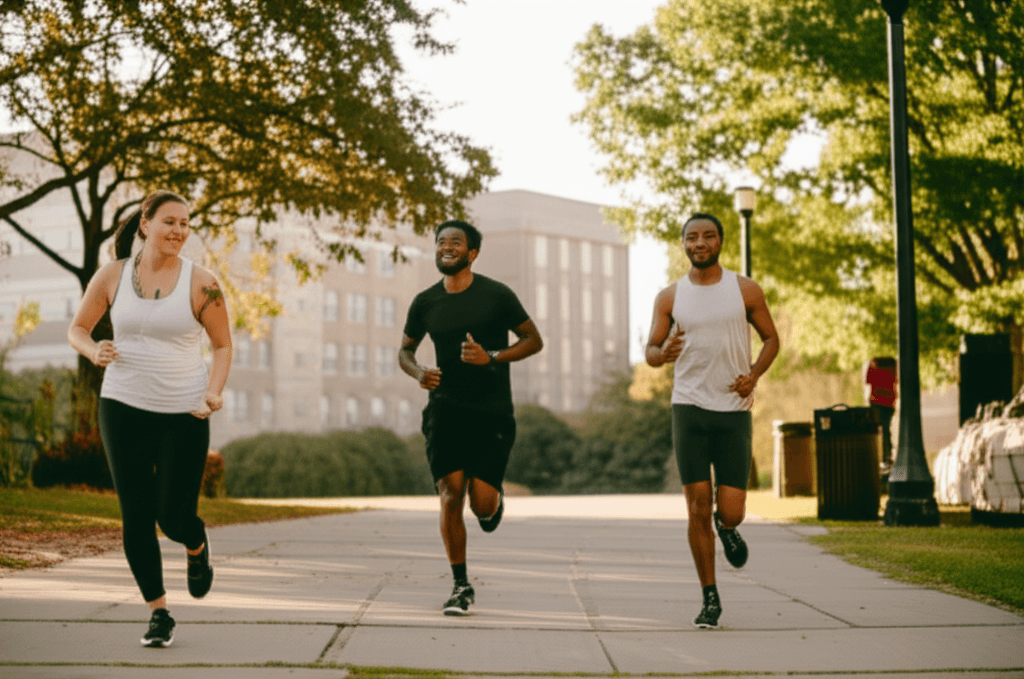The college years are a period of significant growth, but they also present unique challenges that can impact mental well-being, with a substantial number of students experiencing mental health issues. As institutions seek effective strategies to support student mental health, research is increasingly highlighting the profound connection between physical activity and psychological well-being. A recent study published in Frontiers delves into this crucial link, specifically examining the relationship between college students’ autonomous fitness behavior and their mental health literacy, and uncovering the intricate “chain mediating effect” of self-control and exercise identity.

Understanding the Core Concepts
To fully appreciate the study’s findings, it’s essential to define its foundational elements: autonomous fitness behavior, mental health literacy, and the concept of chain mediation.
What is Mental Health Literacy?
Mental health literacy is broadly defined as “knowledge and beliefs about mental disorders which aid their recognition, management or prevention”. This encompasses several key components, including:
- The ability to recognize specific mental disorders and types of psychological distress.
- Knowledge and beliefs about risk factors and causes.
- Understanding of self-help interventions and available professional support.
- Attitudes that facilitate recognition and appropriate help-seeking.
In essence, high mental health literacy empowers individuals to understand their own mental health, recognize signs of distress in themselves and others, and take proactive steps toward seeking help and maintaining well-being.
Defining Autonomous Fitness Behavior
Autonomous fitness behavior refers to self-directed, voluntary exercise driven by intrinsic motivation, rather than external pressures. It is characterized by an individual’s sense of choice, personal endorsement, and satisfaction derived from the activity itself. This behavior aligns with an individual’s will and sense of self-determination, emphasizing personal preferences, goals, capabilities, and resources. When fitness activities are autonomous, individuals are more likely to persist, as they fulfill innate psychological needs for autonomy, competence, and relatedness, as proposed by Self-Determination Theory.
The Mechanism of Chain Mediation
In statistical terms, a chain mediating effect describes a sequence where an independent variable’s effect on a dependent variable is transmitted through two or more mediating variables in a sequential pathway. Instead of a direct link, the independent variable influences a first mediator, which then affects a second mediator, and so on, ultimately impacting the dependent variable. This model helps researchers understand the complex underlying mechanisms or processes through which one variable influences another, clarifying the causal relationship.

The Study: Exploring the Interconnections
The study, “The relationship between college students’ autonomous fitness behavior and mental health literacy: chain mediating effect test,” aimed to unravel how self-directed physical activity impacts college students’ mental health understanding and attitudes, specifically through the roles of self-control and exercise identity. Conducted among college students, this research sought to fill a gap in understanding the autonomous nature of exercise and its psychological benefits, particularly within the context of higher education.

Key Findings: A Direct and Indirect Impact
The research uncovered a significant positive association between autonomous fitness behavior and mental health literacy among college students. Crucially, it established not only a direct link but also indirect pathways through mediating variables.
The Direct Link
The study found that autonomous fitness behavior directly predicts mental health literacy. This suggests that when college students engage in physical activity because they genuinely choose to and enjoy it, they tend to have a better understanding of mental health, including the ability to recognize symptoms, know about treatments, and hold positive attitudes toward help-seeking. Existing research supports a positive link between general physical activity and mental health literacy, with exercise improving emotional regulation, self-efficacy, and stress coping.
The Chain Mediating Effect of Self-Control and Exercise Identity
Beyond the direct effect, the study revealed a significant chain mediating effect involving self-control and exercise identity. This means that autonomous fitness behavior influences mental health literacy in a sequential manner:
- Autonomous Fitness Behavior → Self-Control → Mental Health Literacy: The findings indicate that autonomous fitness behavior first enhances self-control. Engaging in self-determined physical activity cultivates self-regulation and discipline. This improved self-control then contributes to enhanced mental health literacy, possibly by enabling students to better manage stressors and regulate emotions. The study quantified this indirect path, with self-control independently mediating the relationship, accounting for 5.77% of the total effect.
- Autonomous Fitness Behavior → Exercise Identity → Mental Health Literacy: The research also showed that autonomous fitness behavior positively predicts exercise identity, which, in turn, positively predicts mental health literacy. Exercise identity refers to the degree to which an individual perceives themselves as an exerciser, integrating fitness into their self-concept. A stronger exercise identity acts as a stable internal driver for sustained participation, fostering psychological flexibility and self-regulation, which are key components of mental health literacy. This indirect path via exercise identity accounted for a more substantial 37.25% of the total effect.
- Autonomous Fitness Behavior → Self-Control → Exercise Identity → Mental Health Literacy: The most significant finding was the establishment of a chain mediating effect where autonomous fitness behavior first enhances self-control, which then strengthens exercise identity, ultimately leading to improved mental health literacy. This sequential pathway suggests a virtuous cycle: engaging in self-chosen fitness activities boosts one’s ability to regulate behavior (self-control), which deepens their sense of identity as an exerciser, and this enhanced identity further elevates their understanding and engagement with mental health. The indirect effect of this full chain was 0.066.
These findings highlight that the combined influence of self-control and exercise identity, acting in sequence, provides a robust explanation for how autonomous fitness behavior contributes to better mental health literacy.

Demographic Insights
Interestingly, the study observed significant gender differences, with male college students scoring higher than females in autonomous fitness behavior, self-control, and exercise identity. However, no significant differences were found across age groups regarding the key variables. These demographic insights can inform more tailored interventions.

Implications for Mental Health Interventions in Higher Education
The results of this study offer valuable insights for developing targeted mental health interventions in college settings. By understanding the mechanisms at play, educators and mental health professionals can design programs that:
- Promote Autonomous Fitness: Encourage students to engage in physical activities they genuinely enjoy and choose, fostering intrinsic motivation rather than relying on external mandates. This could involve diverse program offerings, flexible schedules, and opportunities for personal goal setting.
- Cultivate Self-Control: Integrate elements within fitness programs that strengthen self-regulation skills, such as goal-setting workshops, mindfulness practices, and strategies for overcoming barriers to consistent exercise.
- Build Exercise Identity: Help students to see themselves as “exercisers” and integrate physical activity into their self-concept and value system. This could involve celebrating achievements, fostering a sense of community around fitness, and emphasizing the long-term benefits of an active lifestyle.
- Enhance Mental Health Literacy Directly: Continue to provide direct education on mental health, including symptom recognition, help-seeking resources, and stigma reduction, alongside physical activity initiatives.
By focusing on fostering autonomous fitness behavior and recognizing its mediating effects through self-control and exercise identity, higher education institutions can create more holistic and effective strategies to enhance college students’ mental health literacy and overall well-being. This research provides preliminary evidence, laying the groundwork for future studies and interventions that harness the powerful connection between mind and body.







